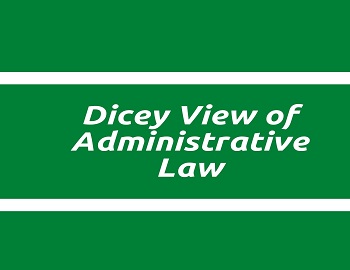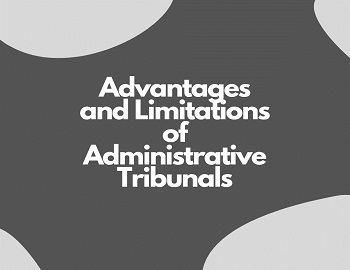Dicey View of Administrative Law:
Dicey identified Administrative Law with that particular part of the French Droit Administratiff according to which actions by the citizens against officials for wrongful acts committed in their official capacity are tried, not by ordinary courts of law, but by special administrative courts manned by civil servants. Since such a system of courts did not exist in England, Dicey described Administrative Law as contrary to the Rule of Law which is the basic principle of the British constitution. Dicey referred to three distinguishing features of Droit Administratiff-
(1) The rights of the state officials are determined by a special body of laws and rules which are not applicable to the citizens.
(2) The ordinary courts do not have jurisdiction in cases in which the state or state officials in their official capacity are a party.
(3) Special protection was given to officials in France for wrongful acts done in the course of their duty.
In contrast to this, observes Dicey, the Rule of Law has the following features-
(1) Absolute supremacy of the ordinary law of the land permitting no arbitrary power or discretion to administrative authorities and under which no person was punishable except for an actual breach of law proved in the ordinary courts.
(2) Equality of both officials and non-officials before the ordinary law of the land as administered by ordinary courts.
(3) Primacy of the rights of the individuals which are the source of the constitutional law.
Criticism of Dicey’s View- Several eminent writers like Jennings, J. H. Morgan, W. A. Robson, F. G. Goodrow, however, do not accept Dicey’s views on Administrative Law. They are of the view that Dicey’s appraisal of Droit Administratiff in France identifying a particular aspect of it with the concept of Administrative Law and his non-acceptance of such a system of law in Britain was also fallacious. Its existence in Britain cannot be denied.
The following are the main points of criticism against Dicey’s interpretation of Administrative Law-
(1) Dicey’s view that the French Droit Administratiff gave special protection to officers is incorrect. Morgan has correctly contended that Droit Administratiff was not to shield the officials but to extend that liability to cases in which they would be insured in the U.K. Indeed, the French Council of State- the highest administrative tribunal- has proved to be the guardian of the people’s liberty. Duguit says, “The French Council of State afforded the Frenchmen an almost perfect protection against arbitrary administrative action”. Comparatively, in the U.K., the officials were safeguarded by laws like the Protection Act 1893 which limited the right of the citizens to sue officials for acts done in the course of their duties.
(2) Dicey was not quite candid in his estimate of the nature and effect of the Rule of Law in Britain. It is wrong to assume that the State and the citizens were being governed by some ordinary law and that the State had no discretionary power. As W. A. Robson rightly says, “In England also, there was always a special body of law applicable to the activities of administrative authorities only and giving them special rights, powers, duties, and liabilities entirely different from those of the citizens”.
(3) Dicey’s statement that under the Rule of Law, the administrative authorities and the citizens have equality before law is also incorrect. Under the Crown Proceedings Act 1947, the Crown is immune to liability in courts.
Thus, Dicey’s analysis of Droit Administratiff in general and French Droit Administratiff, in particular, is governed by his own prejudices and commitments. Administrative Law is present and in operation in every state including Great Britain and it is a body of law that defines the relationship between the public officials and the ordinary citizens. It is wrong to say that administrative law gives a special and superior position to officers vis-a-vis ordinary citizens.









Comments (No)